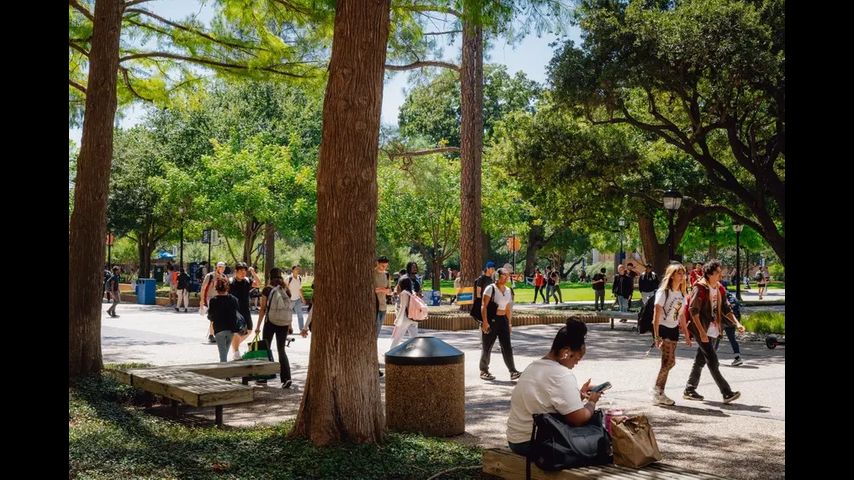Judge denies undocumented students’ attempt to challenge sudden loss of in-state tuition
Sign up for The Brief, The Texas Tribune’s daily newsletter that keeps readers up to speed on the most essential Texas news.
A federal judge on Aug. 15 rejected a bid by undocumented students, immigrant rights advocates and Austin Community College to intervene in a case that ended access to in-state tuition for certain undocumented students, a setback for their effort to overturn the ruling.
Students for Affordable Tuition filed notice on Aug. 16 that it would appeal U.S. District Judge Reed O'Connor's decision, and a second group — including a University of North Texas student, La Unión del Pueblo Entero, and Austin Community College — filed its own notice of appeal on Aug. 18.
O'Connor said the groups' request came too late and they did not have the legal authority to defend the law, which he said rests with the Texas Attorney General's Office. He said that office had adequately represented their position, even if it chose not to raise every constitutional argument they wanted.
On June 4, just two days after the Legislature ended its regular session without repealing the law, the U.S. Department of Justice sued Texas for allowing certain undocumented Texans to qualify for lower tuition rates at public universities. Texas quickly agreed with the Trump administration’s claim that the law was unconstitutional and asked a judge to find the law unenforceable.
The quick turnaround — the whole lawsuit was resolved in less than six hours — represents a “contrived legal challenge designed to prevent sufficient notice and robust consideration,” lawyers for these students argued in their motion to intervene.
Students for Affordable Tuition asked to intervene on June 11, and a second group followed June 23: Oscar Silva, a 24-year-old University of North Texas student; La Unión del Pueblo Entero, an advocacy group in the Rio Grande Valley; and Austin Community College. The Justice Department and the Texas attorney general’s office opposed the motion on the grounds that the matter has been resolved and the case is terminated, court documents say.
O’Connor, the George W. Bush appointee who blocked the law, has long been a favored judge for the Texas attorney general’s office and conservative litigants. The Justice Department filed its lawsuit in the Wichita Falls division of the Northern District of Texas, where O’Connor hears all cases.
The people who are most impacted by a lawsuit typically have a right to have their voices heard on a case, said David Coale, a Dallas appellate attorney. Getting O’Connor to agree to reopen might be a tough sell, he said, but if they’re denied, they could appeal that ruling and the rest of the case alongside it, to the 5th U.S. Circuit Court of Appeals.
“The 5th Circuit’s obviously a very conservative court, but part of that conservatism is a pretty limited view of the judicial role,” Coale said. “So if they get a chance to argue their case there … they may have some luck.”
The law, which had been in effect since 2001, granted in-state tuition to anyone who has been living in the state for three years and graduated from a Texas high school. All students who claimed this benefit were required to sign an affidavit saying they intended to apply for permanent legal residency as soon as they were able; many of them are here as part of the Deferred Action for Childhood Arrivals program.
The Students for Affordable Tuition's motion laid out the human impact of the law’s sudden reversal — a man who is reconsidering his plans to go to medical school in Texas; a woman who will have to drop out of her masters program, where she was studying to become a counselor; a teacher-in-training who will have to delay her plans to graduate and begin working.
They are represented by the Mexican American Legal Defense and Educational Fund, which said in a press release that the abrupt overturning of the law has left students scrambling.
Attorneys for the second group requesting to intervene wrote in their motion that Silva, who is seeking a bachelor's degree in economics and a master's degree in accounting, cannot afford out-of-state tuition and will be unable to graduate next spring. At Austin Community College, they wrote, the ruling could affect more than 400 students, quadruple the tuition of some, lead others to drop out and deter potential students from enrolling.
Disclosure: The University of North Texas has been a financial supporter of The Texas Tribune, a nonprofit, nonpartisan news organization that is funded in part by donations from members, foundations and corporate sponsors. Financial supporters play no role in the Tribune's journalism. Find a complete list of them here.
Big news: 20 more speakers join the TribFest lineup! New additions include Margaret Spellings, former U.S. secretary of education and CEO of the Bipartisan Policy Center; Michael Curry, former presiding bishop and primate of The Episcopal Church; Beto O’Rourke, former U.S. Representative, D-El Paso; Joe Lonsdale, entrepreneur, founder and managing partner at 8VC; and Katie Phang, journalist and trial lawyer.
TribFest 2025 is presented by JPMorganChase.
This article originally appeared in The Texas Tribune at https://www.texastribune.org/2025/06/11/texas-in-state-tuition-undocumented-students-lawsuit-paxton-trump/.
The Texas Tribune is a member-supported, nonpartisan newsroom informing and engaging Texans on state politics and policy. Learn more at texastribune.org.




